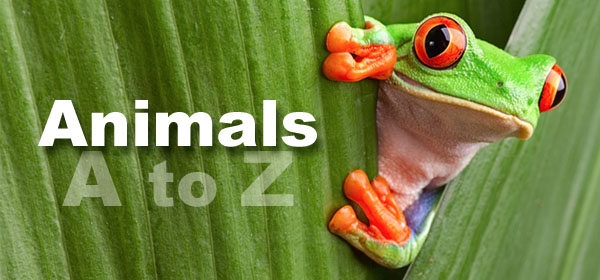International Primate Day is celebrated on the 1st September each year and us primate keepers certainly love a good excuse to celebrate with our animals. It is a day to promote humane treatment of primates as well as raise awareness about their endangerment. Sadly for so many primate species they now fall under the IUCN redlist ‘endangered’ or ‘critically endangered’ species categories; including all great ape species. So for this blog I thought I would shed some light on a few of the primates we have here who fall into those categories.
Chimpanzees
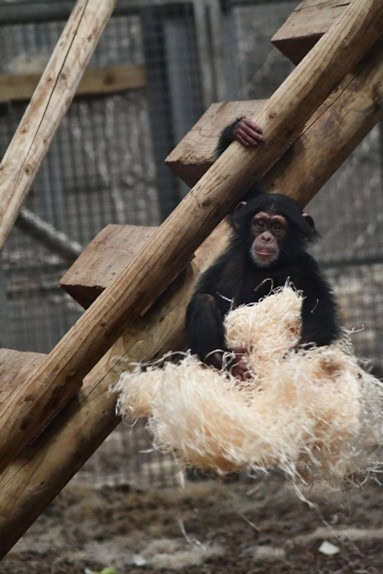
Photo by Savannah, Primate Keeper
Western chimpanzees are a critically endangered species with a decreasing population trend. They face a number of threats in the wild, including: habitat destruction and fragmentation, the bushmeat trade and also disease.
Here at Wingham, we are home to a fantastic troop of nine western chimpanzees. Our adults (Fritz, Lucas, Tara, Georgia, Agatha, Elvira and Faye) came from a research facility over in the USA back in October 2016. When they arrived at the park, they were enrolled into the EEP (European Ex-situ Breeding Program) which allows us the opportunity to breed certain individuals. We then welcomed naughty Elizabeth, who was born on the 19th January 2018 and then little Margaret on the 3rd December 2023.
Cotton Top Tamarins
Cotton top tamarins are a critically endangered species with a decreasing population trend and, according to the IUCN red list, there are only around 2000 mature individuals left. These small monkeys are also struggling with habitat destruction as well as the illegal pet trade.
Here at the park, we have Tina and Yoto who are arguably the best looking monkeys. They have the best hairdos of any of our primates, in fact Tina was named after Tina Turner to complement the epic hair goals.
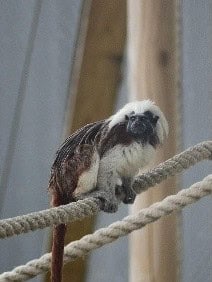
Photo by Savannah, Primate Keeper
Lemurs, Lemurs, Lemurs
We are extremely lucky here at the park to be home to three species of lemur. We have our six male ring-tailed lemurs, two male black lemurs and our three female black and white ruffed lemurs. If I was to recommend any of our experiences, I would definitely say that the lemurs is up there with one of the best, our boys love meeting new people!
Ring-tailed lemurs and black lemurs are both endangered species, whilst the black and white ruffed lemur is now classed as a critically endangered species. All three species are threatened with deforestation as well as the illegal pet trade.
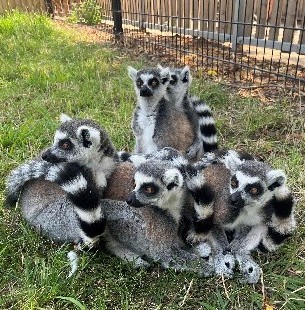
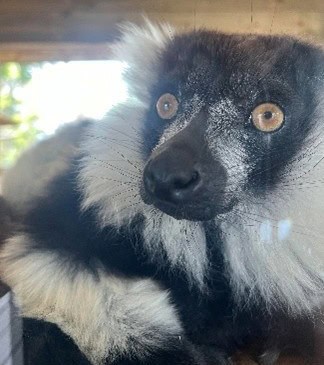
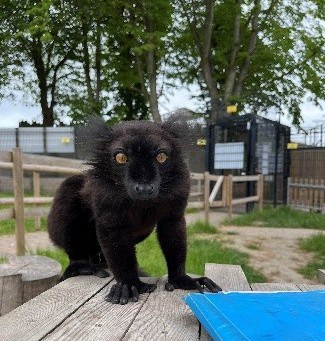
Lemur Photos by Holly, Deputy Head of Primates
Barbary Macaque

Photo by Savannah, Primate Keeper
The population of the Barbary macaques in Gibraltar is the only one outside Northern Africa and the only population of wild monkeys in Europe. They have a number of threats out in the wild including: climate change, human intrusion, agricultural interference as well as the common habitat destruction.
At Wingham, we are home to a group of seven macaques, four of which were actually born here at the park and are one of the first animals that our visitors see when they enter the park.
Bornean Orangutan
With populations declining out in the wild, these majestic apes are classed as a critically endangered species. With their wild homes being developed for residential areas, agricultural land uses as well as climate change playing a detrimental role in the species dropping numbers.
Recently, we welcomed a tiny new orangutan baby to the park, who was born to the proud parents of Jin and Awan on the 26th July 2025. We also are home to Belayan and Molly, the nosey neighbours, who live next door.
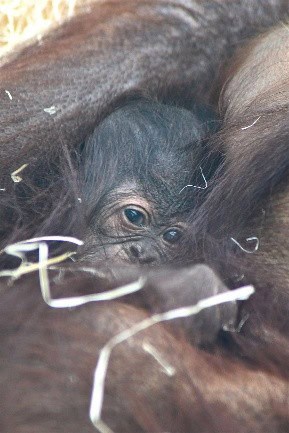
Photo by Savannah, Primate Keeper
We are extremely lucky at the park to be apart of so many fantastic breeding programmes to ensure we have a healthy, viable, breeding population to help prevent the extinction of such amazing species. We also support the Wingham Wildlife Park Animal Welfare, a charity dedicated to the alleviation of suffering of animals in need and the conservation of Earth’s natural resources.
I hope you have enjoyed learning about just a handful of our primates who may be struggling out in the wild but who are getting some amazing work carried out to help save their species.
By Holly, Deputy Head of Primates.
